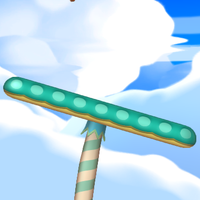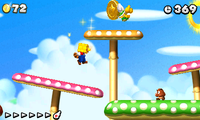Tilting mushroom
| Tilting mushroom | |
|---|---|
 Screenshot from New Super Mario Bros. U | |
| First appearance | New Super Mario Bros. (2006) |
| Latest appearance | New Super Mario Bros. U Deluxe (2019) |
| Effect | Narrow platforms that tilt back and forth on their own |
| Variant of | Mushroom Platform |
Tilting mushrooms,[1] also referred to as unstable mushrooms,[2] are Mushroom Platforms in the Super Mario series that debuted in New Super Mario Bros. Unlike stationary Mushroom Platforms or Seesaw Shrooms, tilting mushrooms sway back and forth all on their own. They typically appear in athletic sky-themed levels, in which their movements necessitate well-timed jumps. Tilting mushrooms are of varying widths and heights, and their overall design is different between titles.
History
New Super Mario Bros.
Tilting mushrooms appear throughout New Super Mario Bros.—the only game where tilting mushrooms occur in more than one level. Tilting mushrooms can be used to reach distance or heightened platforms, collect Star Coins, and find secrets. The way they tilt impacts the trajectory of launched Koopa Shells that slide along their caps.
Tilting mushrooms first appear in the sky-themed World 1-3 alongside static Mushroom Platforms and Mushroom Trampolines. They subsequently occur in World 2-2 and World 3-2. In World 2-2, the Spiny Eggs dropped by Lakitus roll down tilting mushrooms as they sway.
New Super Mario Bros. Wii
Unstable mushrooms occur only in World 8-1 in New Super Mario Bros. Wii. Unlike other games, these mushrooms are low to the ground and in a lava-themed level with volcanic debris falling from the sky. The caps of the unstable mushrooms intercept the debris and can be stood under to avoid contact, but their movements make protection inconsistent. Unless they are in their Propeller form, the first Star Coin in the level can only be reached by the player character if they jump off the edge of a very wide unstable mushroom as it tilts to the left.
In this game, the unstable mushrooms have dull indigo caps with white spots, and striped stalks. The caps jiggle slightly when struck by volcanic debris. Some are rooted directly in lava.
New Super Mario Bros. 2

In New Super Mario Bros. 2, tilting mushrooms occur only in World 1-4, an athletic level in the sky. The are physically identical to normal Mushroom Platforms, but the caps are always pink with white spots. The way the mushrooms tilt allow Mario (or Luigi) to reach ? Blocks, coins, Gold Rings, and Star Coins, as well as cross gaps. Tilting mushrooms are the only platforms in an sub-area accessible via a blue Warp Pipe, where the level's second Star Coin is.
New Super Mario Bros. U / New Super Mario Bros. U Deluxe
Tilting mushrooms appear only in Mushroom Heights, the first sky-themed level in New Super Mario Bros. U and New Super Mario Bros. U Deluxe. They appear alongside normal Mushroom Platforms and pink ones that move up and down. In this game, the tilting mushrooms have turquoise caps, and a helix of cream and turquoise colored stripes around the stalk. Flowers grow out of the caps of some wide tilting mushrooms. The mushrooms provide allow the player character to collect Hidden Coins and reach taller Mushroom Platforms at the furthest extremes of their tilts. Balloon Baby Yoshis can be used to navigate the level without being too reliant on these platforms.
Tilting mushrooms are one of the few objects in New Super Mario Bros. U to not appear in New Super Luigi U, though their design is inherited by Mushroom Platforms that move up and down in the level Piranha Heights.
Gallery
Names in other languages
| Language | Name | Meaning | Notes |
|---|---|---|---|
| Japanese | 揺れるキノコ[3] Yureru Kinoko |
Tilting Mushroom | |
| ゆれるキノコ[4] Yureru Kinoko |
Shaking Mushroom | New Super Mario Bros. 2 |
References
- ^ Knight, Michael (2010). Nintendo DS Pocket Guide. Roseville: Prima Games. ISBN 978-0-307-46760-7. Page 22.
- ^ Bueno, Fernando (2009). New Super Mario Bros. Wii: PRIMA Official Game Guide. Roseville: Prima Games. ISBN 978-0-307-46592-4. Page 152.
- ^ Sakai, Kazuya (Ambit), kikai, Akinori Sao, Junko Fukuda, Kunio Takayama, and Ko Nakahara (Shogakukan), editors (2015). 『スーパーマリオブラザーズ百科: 任天堂公式ガイドブック』. Tokyo: Shogakukan (Japanese). ISBN 978-4-09-106569-8. Page 119, 151, 217.
- ^ ---- (2015). "New Super Mario Bros. 2" in 『スーパーマリオブラザーズ百科: 任天堂公式ガイドブック』. Tokyo: Shogakukan (Japanese). Page 201.




